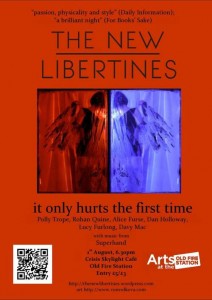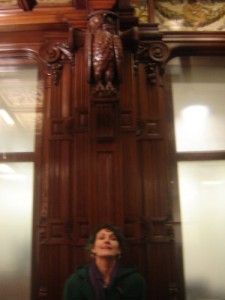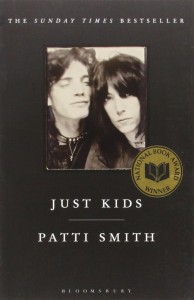Interview: Lucy Furlong
Writer, wordsmith, poet
I met Lucy Furlong when she took part in The New Libertines (described by its founder as a touring troupe of troubadour tearaways) It Only Hurts The First Time event last summer, and we recently bumped into each other at Alice Furse’s book launch, where we discussed all things poetry and publishing related with Clive Birnie of Burning Eye Books. Naturally, I spent the train journey home pestering Lucy to come on the blog and so I’m delighted that she has finally caved in.
Q: Lucy, have you always felt driven to write?
Yes – so much so that I didn’t recognise that writing was a ‘thing’. I’ve always done it to a greater or lesser extent, and took it for granted until relatively recently.
Q: Who was it who gave you your first encouragement?
Various people have encouraged me over the years. I sang in a band when I was in my late teens and early twenties so wrote lots of song lyrics, some wince-inducingly terrible if I dare to read them now, and some that have just about stood the test of time.
My real discovery that I am a writer was when I was commissioned by Resonance FM back in 2005 to make a thirteen-part radio series for them all about footwear. Ed Baxter and Richard Thomas gave me complete creative freedom to make the shows as I wanted, which was an incredibly positive and liberating experience, although some of the shows were probably a bit wild, and in retrospect could have done with some reigning in! I (very originally) titled it The Shoe Show, and researched, wrote, interviewed, produced, presented and even wrote and sang the theme tune.
After hearing the first episode air I realised that writing was what I wanted to do, and had been doing in a kind of ‘in spite of it’ way all through the various other creative projects I had been involved in through the years. I was thirty-five at the time so it took me a while but I hope I have been making up for lost time ever since.
Q: We are constantly being told that readers have decreasing attention spans. Does this mean that poetry is receiving a surge in popularity?
The thing about a lot of poetry is that it needs your full attention. It’s distilled writing and it requires an investment from the reader, several readings, or some pondering, or at least a moment of reflection. I like that about it but then it would be a bit strange if I didn’t. Poetry books are mostly bought and read by poets. And large book chains are pretty bad at stocking a wide range of contemporary poetry. It gets tucked away in a corner. The big established names do well but the more interesting and current work gets missed by a larger reading public, who may be unsure about investing in a whole collection by a new poet and instead stick to the safety of one of the (admittedly mostly very good and worth having) anthologies published by traditional publishers such as Faber.
Q: How would you describe your poetry?
The poetry I write is paradoxical in that some of it is L=A=N=G=U=A=G=E based and process-oriented experimental work, and some of it is more traditionally narrative and lyrical work which is more easily recognised as ‘poetry’. Since graduating from the MFA in Creative Writing at Kingston University at the beginning of this year, my work has definitely gone through significant changes and development, which is exciting but also makes it hard for me to articulate clearly what it is exactly. I do also tend to work on a range of projects at the same time, which means I am always writing using different forms and addressing different subjects.
Q: What are the greatest challenges in working within a limited word-count? I imagine every word must count.
Every word counts in a poem, even if that poem is a prose poem a thousand words in length. Each word has to earn its place in creating the right construction, tone and tension, as well as meaning – if you require meaning to be part of the poem’s intention. It may be that that word is there for its sound or shape alone, and of course that’s fine too. All of this needs interrogating – or maybe it doesn’t, does it?
It is certainly a different way of approaching language from writing prose, needing a change of headset. I write both, although I am known as a poet. If you are working within a strict form, say a sonnet or a sestina, the form presents you with challenges which stretch your diction and how you construct a line. Although I write in free verse, I have found the discipline of writing using traditional forms of poetry very useful for flexing lexical muscle and increasing myvocabulary.

Q: I recently saw you read at the New Libertines event. Much is made of the phrase, performance poetry. Does this add to the pressure of reading your work?
It’s one of those subjects in poetry that everyone has an opinion on and it can be very difficult and even controversial to talk about a definition of performance poetry and what is performance in poetry. I am not going to get into it here but all I can say about my own forays into reading/performing poetry is that I think about what is the right thing to do for each poem I am reading, in the context of where I am reading at the time.
I’ve been going to open mic nights for a few years, which is an excellent way of getting out into the world of poetry and getting to grips with the scariness of standing in front of a crowd and reading your work. It can be nerve-wracking. Early on I fluffed an open mic reading at Loose Muse, Agnes Meadows’s night for women writers, held at the Poetry Cafe. It was deeply embarrassing but the two professionals who were reading that night, Catherine Brogan and Zena Edwards, and the host, Dfiza Benson, were all so supportive and kind that I managed to get over it and keep going. It’s really important to have the bad experiences (although hopefully not too many) and know that life continues and you can get up there and do it again afterwards.
In the last year or two I’ve been invited to go and read my work which is a step on from open mic and really exciting, and I love it. In the next year I hope to find time to focus properly on performance and write something for an audience.
Q: I have sometimes had a Eureka moment many edits into a novel. Has the performance of a poem in front of an audience ever changed the way that you feel about one of your own poems?
Definitely. Going and reading poems in front of an audience, especially new work, has helped to develop and even change some of them completely. Getting a response and seeing what’s working and what isn’t is very valuable. Even reading poems aloud at home changes the way you see them on paper. Hearing them allows you to see where there might be problems with the writing, and to correct them, where you wouldn’t have otherwise.
Q: I am often asked how much of me is in my characters. The characters in poetry are sometimes less obvious, but do you write in character or as yourself?
Both and somewhere in between depending on what I am writing. Some of my poems are autobiographical and in my own voice. For example the poem Drift with Buggy in Amniotic City is about the last time I took my son out in his buggy just as he was getting big enough not to need it any more. Others are based on personal events and experience but manipulated or distorted or exaggerated in terms of the voice. I suppose you might describe them as having an unreliable narrator. I have poems which mention other poets and writers such as Mina Loy and P L Travers, where I place them together in a real contemporary setting (my back garden) and imagine what happens next. It’s fun to try different voices, characters and situations out and mix them up and see what happens!
Lucy Furlong Writer – Wordsmith – Poet
With Amniotic City you have produced a map, encouraging readers to walk to the places that influenced the poems. How did that project come about?
A large proportion of my writing is based on place, and I am interested in psychogeography. One of my favourite things to do is walk around London. One day I was walking around the Temple and Fleet Street with a friend and we started to explore the tiny passageways around St Paul’s. We found Carter Court, and it felt very old and magical, especially the oak doorway and passageway. The first poem, Field Recordings in Carter Court, came from there. After that I decided to write a collection based on walks or drifts, as they are also known in psychogeographical terms, around that area. I document all my walks with photos, so when I had the poems and photos ready I discussed what to do next with my best friend, who also happens to be a hugely talented graphic designer, and we came up with the idea of a map. She designed Amniotic City and did an amazing job. It was self-published in October 2011 and the first edition is now just about sold out.

You posted a very moving piece on your blog after the death of Maya Angelou. What is it about the poem Still I Rise that moves you? (I love her laughter on the piece).
It’s such a powerful poem, an important moment in the history of women’s writing, and so beautifully written. I loved the way she introduces it. And yes, her reading, her pauses, her laughter – it’s so rich and wise and deceptively relaxed. I find it deeply reassuring and life-affirming. I also wanted to acknowledge her passing on my blog.
You’ve already mentioned song lyrics. What is the difference between a song lyric and a poem? Are there any lyricists who you feel blur the boundaries?
Patti Smith has been a big influence on me in the last few years. I got quite obsessed with her. Her book Just Kids is a great read and a memoir of her early years in New York City with the photographer Robert Mapplethorpe. Her writing definitely blurs the boundaries between lyrics and poetry, and she is influenced by Rimbaud and Blake, so what’s not to like! But it’s her performing and her commitment to her work that that I find so inspiring. I wrote the poem, The Pissing Punk Pilgrim of Poetry, about her, which incorporates me singing part of her song Horses, that you saw me perform at the New Libertines gig.

Click here for read inside feature
I grew up with the work of Laurie Anderson. Have you ever incorporated music into a performance?
I remember O Superman being in the charts and being amazed at how someone could create something that seemed so alien and so satisfying to listen to at the same time.
I am dying to mix up some music and poetry. I have sung poems acapella, but I haven’t actually incorporated music…yet.
In March this year, your poem, Lunch in Ars en Re was nominated for the Forward Prize for best single poem. It captures a moment with such amazing clarity. I see from your blog that you take a lot of photographs. Are these part of the process that you use to recall the atmosphere of a day?
Yes, photos are intrinsic to my writing process, whether I am writing poetry or prose. I take photos of everything , all the time, much to the frustration, sometimes, of friends and family. I lost my old camera at the end of June and was lost myself without it. I borrowed a very basic digital camera until I had enough money to buy a new one but it felt very uncomfortable to be without a camera of my own for a couple of months. It’s so important to my work it’s not really an option not to have one. I’ve got a good eye for a picture but have no training in photography apart from a couple of basic courses I took years ago. I am also a bit of a Luddite with technology in that I will work out what works and then stick to it doggedly until circumstances force a change. So it was probably time for a change!
Q: Some writers need silence, others like the buzz of a coffee shop, the rumble of a train or their favourite music. Which type are you?
I write wherever I am, with whatever I’ve got, which has meant in the past coming home and transcribing eyeliner scrawls written on receipts, gig tickets and napkins. These days I always have paper and pens with me. I like to go to cafes for atmosphere and buzz, and to free write without the ever-present distraction of the internet. If I’m at home I sit at my dining room table and listen to the radio. But for final edits and rewrites I tend to work in silence.
Q: What advice would you give aspiring writers?
Write exactly what you want to write; don’t worry about what everyone else is doing. Try and get as close as you can to what you want to say – you will never do it – that’s part of the pull/obsession. Don’t compare yourself to what seems to be doing well in the marketplace or what is fashionable or popular. Read what inspires you. Read widely, read bad stuff too. Read whatever you can get your hands on. Keep writing, keep all your drafts, don’t be afraid to try things out. Keep writing.
Q: I feel bad asking this, because it’s a question I hate to answer, but what are you working on at the moment?
I am currently working on a new map, Over The Fields, which will be self-published next February. Some of the work-in-progress for this was recently on display as part of The Art of Walking show at the Museum in the Park, Stroud, and it was also mentioned in the Times Literary Supplement.
Left wanting more?
Visit Lucy’s website, read her blog, or follow her on Twitter @lucyfurleaps
Read Dan Holloway’s review of Amniotic City for the Guardian , which he highlights as one of the gems of self-publishing.
Browse The Art of Walking show catalogue
Find out more about The Art of Walking show (the Time Literary Supplement mentions Lucy’s contribution).
Update, April 2015
Lucy’s poetry collection, Clew, has just been published by Hesterglock Press. Order it now!


